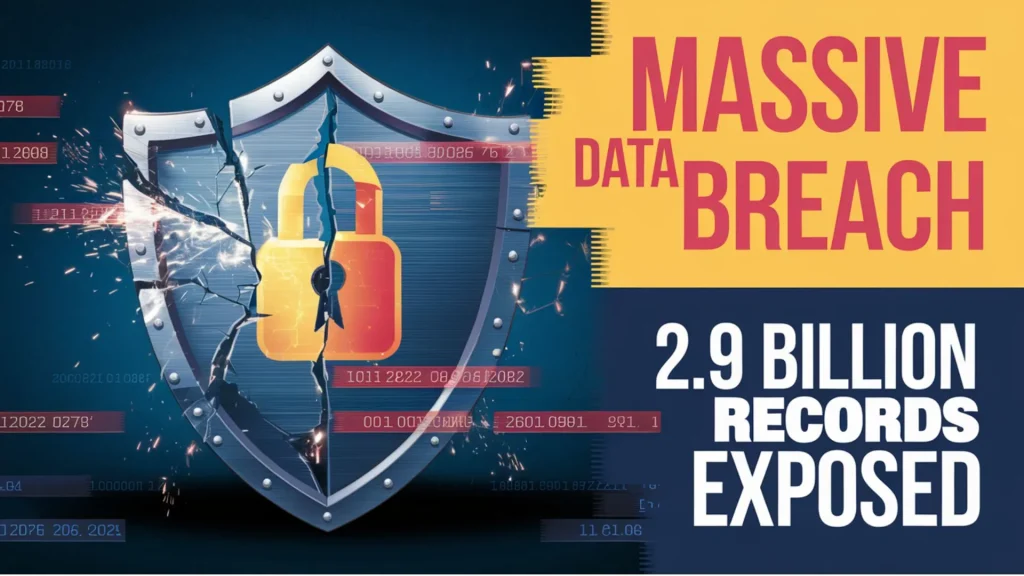Massive Data Breach Exposes 2.9 Billion Records: In a shocking turn of events, the personal information of 2.9 billion individuals has been exposed on the dark web, marking one of the most significant data breaches in history. This incident, affecting nearly 40% of the global population, has sparked widespread concerns over cybersecurity and the protection of personal data. The breach involves a background check company named National Public Data (NPD), also known as Jericho Pictures, based in Coral Springs, Florida. This article delves into the details of the breach, its repercussions, and the steps being taken to mitigate its impact.
The Genesis of the Breach: How Did It Happen?
National Public Data (NPD) employed a data collection method called “scraping,” which involves gathering personally identifiable information (PII) from non-public sources for background checks. This collected data includes highly sensitive details such as Social Security numbers, full names, current and past addresses, and even information about relatives. Alarmingly, many of the individuals affected by this breach were unaware that their data was being collected and stored by NPD, as they did not directly provide it to the company.
The breach came to light when a notorious cybercriminal group named USDD posted a database titled “National Public Data” on a dark web forum, offering it for sale at a staggering $3.5 million. This database, containing information collected between 2019 and 2024, has become a prime target for identity theft and fraud, leaving millions of individuals vulnerable.
Table: Key Details of the Data Breach
| Aspect | Details |
| Number of Records Exposed | 2.9 Billion |
| Type of Data Leaked | Full names, SSNs, addresses, and relative information |
| Company Involved | National Public Data (NPD), Jericho Pictures |
| Timeframe of Data Collection | 2019 – 2024 |
| Cybercriminal Group | USDD |
| Price of Database on Dark Web | $3.5 Million |
| Primary Risks | Identity theft, fraud, phishing attacks |
| Legal Action | Class-action lawsuit, demands for stricter security measures |
| Recommended Protection | Monitor financial accounts, use Identity Theft Protection |
The Scope of the Breach: Comparing Historical Incidents
Massive Data Breach Exposes 2.9 Billion Record The magnitude of this breach is immense, rivaling some of the most infamous data breaches in history. A notable comparison can be made with the Yahoo data breach of 2013, which affected 3 billion accounts. While the Yahoo breach involved email addresses and passwords, the NPD breach includes far more sensitive information, heightening the risks for those affected.

Comparative Table: Historical Data Breaches
| Breach Incident | Records Exposed | Data Type | Financial Impact |
| Yahoo (2013) | 3 Billion | Email addresses, passwords | $350 Million |
| NPD (2024) | 2.9 Billion | Full names, SSNs, addresses | Ongoing investigations |
This comparison underscores the severe implications of the NPD breach, not only in terms of the number of records exposed but also in the nature of the data leaked.
Legal Fallout: The Battle for Accountability
The exposure of such sensitive data has led to significant legal action against National Public Data. Christopher Hoffman, a victim of identity theft due to the breach, along with other affected individuals, has filed a class-action lawsuit against NPD. The lawsuit accuses the company of negligence, breaches of fiduciary duty, and unjust enrichment. It demands that NPD take the following actions:
- Encryption of All Collected Information: To ensure that even if data is accessed by unauthorized individuals, it cannot be easily used.
- Regular Security Audits: To identify and address vulnerabilities in NPD’s systems before they can be exploited.
- Comprehensive Employee Training: To reduce the risk of human error leading to breaches.
Additionally, the lawsuit calls for the appointment of a third-party assessor to evaluate NPD’s cybersecurity frameworks annually for the next ten years, ensuring long-term compliance with security standards.
Key Legal Demands and Security Measures
| Legal Demand | Description |
| Data Encryption | Secure all collected data through encryption methods. |
| Security Audits | Conduct regular audits to ensure data protection compliance. |
| Employee Training | Enhance training programs to minimize human error risks. |
| Third-Party Assessments | Appoint an independent assessor for yearly cybersecurity evaluations. |
Massive Data Breach Exposes 2.9 Billion Record These legal demands highlight the critical need for robust cybersecurity measures, especially for companies handling vast amounts of sensitive data.
The Risks: Protecting Yourself from Identity Theft and Fraud
The exposed data poses significant risks, including identity theft, fraud, and other malicious activities. Hackers can exploit this information for:
- Targeted Phishing Attacks: Crafting convincing phishing emails that trick individuals into revealing more sensitive data.
- Credit Fraud: Opening credit accounts in the names of victims, leading to financial losses and damaged credit scores.
- Tax Scams: Filing fraudulent tax returns to claim refunds in the victim’s name.
For those affected by this breach, taking proactive steps is essential. Here are some recommendations:
- Monitor Financial Accounts Closely: Regularly check your bank and credit card statements for any unauthorized transactions.
- Be Cautious of Phishing Attempts: Be vigilant about unsolicited emails or messages asking for personal information, even if they appear to be from legitimate sources.
- Use Identity Theft Protection Services: Consider subscribing to a service that monitors your personal information and alerts you to any suspicious activity.
- $2600 Stimulus Checks in August 2024: What Seniors Need to Know
- Bittersweet Social Security Forecast: COLA 2025 Brings Both Increases and Disappointment
The Importance of Strong Cybersecurity Practices
The NPD breach is a stark reminder of the importance of robust cybersecurity practices. Companies that handle sensitive data must prioritize the following:
- Implementing Strong Data Encryption: Encrypting data ensures that even if accessed by unauthorized individuals, it cannot be easily exploited.
- Conducting Regular Security Audits: Frequent audits help identify vulnerabilities and address them before cybercriminals can exploit them.
- Providing Comprehensive Employee Training: Educating employees about cybersecurity best practices reduces the risk of human error leading to breaches.
- Maintaining Transparency: Companies must be transparent about their data handling practices and promptly notify affected individuals in the event of a breach.
Massive Data Breach Exposes 2.9 Billion Record The ongoing investigation into the NPD breach will likely result in significant legal and financial consequences for the company. However, the most crucial lesson from this incident is the need for a proactive approach to cybersecurity across all industries.
Conclusion
Massive Data Breach Exposes 2.9 Billion Records The massive data breach affecting 2.9 billion individuals serves as a critical warning about the importance of cybersecurity in the digital age. As legal proceedings against National Public Data continue, it is clear that organizations must take greater responsibility for the sensitive information they collect and store.
For individuals affected by this breach, vigilance is the key to protecting against identity theft and fraud. By taking proactive measures, such as monitoring financial accounts and using identity theft protection services, individuals can mitigate the risks posed by this unprecedented data exposure.
FAQ,s – Massive Data Breach Exposes 2.9 Billion Records
What steps should I take if my personal information was exposed in the breach?
If your information was exposed, monitor your financial accounts closely, be cautious of phishing attempts, and consider using identity theft protection services.
How can organizations prevent such breaches in the future?
Organizations can prevent breaches by implementing strong data encryption, conducting regular security audits, providing comprehensive employee training, and maintaining transparency in their data handling practices.
What legal actions are being taken against National Public Data?
National Public Data faces a class-action lawsuit, with demands for stricter security measures, regular audits, and the purging of compromised data. The company may also face significant financial penalties and loss of public trust.





